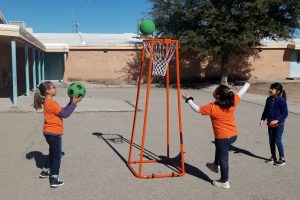A Key Part of Reaching Health Equity for Latino Children? Engaging the School Community
by Rob Bisceglie, CEO
September 16, 2020
Hispanic Heritage Month is a time to celebrate the culture, influence, and achievements of Americans and immigrants of Latin American ethnicity. Nearly 17% of the United States population is Hispanic or Latino, so there is much to be celebrated.
Unfortunately, our Latino/a children face huge health disparities that put them not only at greater risk of illness and disease but make it harder to thrive and succeed in school and beyond. A report from the Latino Consortium of the American Academy of Pediatrics Center for Child Health Research found that Latino children are at higher risk for behavioral and developmental disorders, school dropout, environmental hazards, obesity, diabetes, asthma, and more.
Many of these issues can be traced to the fact that Latino children are more likely to live in poor and underserved communities that lack access to healthcare, nutritious food sources, and opportunities to play and be active. But the Consortium also found that there is not enough cultural competency training of health professionals and linguistically appropriate care, and Latinos are underrepresented in health care professions.
 So how can we, collectively as a nation, address these disparities? In addition to greater investment in high-need communities and more equitable access to affordable – and representative – health care, we can equip families and schools with the tools and resources they need to build kids’ healthy habits and improve their mental and physical well-being.
So how can we, collectively as a nation, address these disparities? In addition to greater investment in high-need communities and more equitable access to affordable – and representative – health care, we can equip families and schools with the tools and resources they need to build kids’ healthy habits and improve their mental and physical well-being.
As an example, we’ve been working for two years so far in El Paso, Texas on a project to engage schools and families in a regional health initiative. Paso Del Norte Health Foundation began an initiative to improve health outcomes for the Paso Del Norte region, but schools were not participating in this collective impact initiative. So, the Foundation reached out to AFHK as the experts in engaging schools and implementing policies. The districts wanted to improve the school health environment but lacked the parent engagement and administrative support needed to make improvements.
The strategies we’ve implemented include:
- Establishing a community coalition, including organizations and agencies that have an impact on child health and deep knowledge of the community
- Engaging with three initial school districts to establish a policy agenda that meets their needs
- Working with school districts and communities to develop stronger District School Health Advisory Councils (SHACs) to engage parents and community partners in wellness decisions and strategies
“Although El Paso is an under-resourced community, with 83 percent of the total population identifying as Hispanic/Latino and some of the highest poverty levels in the state, our rich culture and welcoming nature helps everyone feel at home.” — Kristen Ortega, AFHK District Wellness Project Coordinator.
The results so far are promising: All districts increased parent participation and parent leadership on their SHACs, and one district passed a new recess policy. Additional community members and organizations began participating on SHACs and supporting wellness initiatives, and district PE and Child Nutrition staff began networking on a consistent basis to share challenges and resources. AFHK has also worked with one campus in El Paso ISD to establish a first-ever center for social and emotional wellness.
Of equal importance, working in a border community has revealed important lessons for us around health equity and the power of community. So, as we celebrate Hispanic Heritage Month, we at AFHK would like to thank El Paso and other communities—and the dedicated educators and families within—that have taught us so much and made our work more fulfilling and effective.
Categories: Around AFHK, Making Change Happen